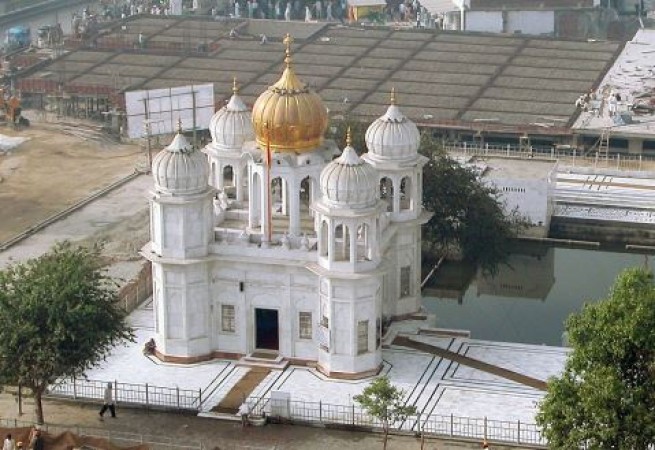
Manji Sahib, also known as the Manji Sahib Diwan Hall, is a significant historical and religious structure in Sikhism. Located in the Golden Temple complex in Amritsar, Punjab, India, Manji Sahib holds great importance for Sikhs worldwide.
Manji Sahib is a traditional Sikh assembly hall where Guru Granth Sahib, the holy scripture of Sikhism, is seated on a Manji (a wooden seat). The term "Manji" refers to a small cot or bed on which the Guru Granth Sahib is placed. "Sahib" is an honorific title used to show respect and reverence. Thus, Manji Sahib is a sacred space where the Guru Granth Sahib is honored and venerated.
Also Read: Gurudwara Sri Tarn Taran: A Saving Boat
The history of Manji Sahib dates back to the time of the fifth Sikh Guru, Guru Arjan Dev Ji, who initiated the construction of the Golden Temple in the 16th century. Guru Arjan Dev Ji envisioned the temple complex as a place of spiritual solace and harmony, open to people of all castes, creeds, and backgrounds. Manji Sahib was established as a central diwan hall where devotees could gather, listen to the recitation of the Guru Granth Sahib, and engage in religious discourse.
The architectural design of Manji Sahib reflects the traditional Sikh style. The hall features intricate marble inlay work, including decorative patterns and inscriptions from the Guru Granth Sahib. The interior of the hall is adorned with delicate frescoes and exquisite artwork that depict scenes from Sikh history and spirituality. The hall's design aims to create a serene and contemplative atmosphere conducive to spiritual reflection and worship.
The significance of Manji Sahib lies in its association with the Guru Granth Sahib, which is considered the living embodiment of the Sikh Gurus. The Guru Granth Sahib contains the teachings, hymns, and compositions of the Sikh Gurus, as well as contributions from other spiritual figures from different faith traditions. Sikhs regard the Guru Granth Sahib as their eternal Guru, providing guidance, inspiration, and a source of divine wisdom.
Also Read: Gurudwara Sri Kartarpur Sahib: Birth Place Of Guru Nanak Dev Ji
Within Manji Sahib, the Guru Granth Sahib is placed on a Manji, covered with a beautifully embroidered canopy, and attended to by devout volunteers known as Granthis. The Granthis maintain a continuous recitation of the Guru Granth Sahib, known as Akhand Path, which ensures that the Guru's message is accessible to all who visit the hall. Devotees bow before the Guru Granth Sahib as a mark of respect and seek spiritual solace and guidance.
Manji Sahib serves as a gathering place for Sikh congregations, where they come together to participate in prayers, kirtan (devotional singing), and religious ceremonies. The hall resonates with the sound of devotional music and the recitation of hymns, creating a spiritual ambience that fosters devotion and unity among the Sikh community.
Also Read: Gurudwara of Delhi: Unique History
Manji Sahib also carries historical and cultural importance. It has witnessed key events in Sikh history and has been a center for social and political gatherings. The hall has stood as a symbol of Sikh identity, resilience, and the pursuit of justice throughout the centuries.
Manji Sahib is a revered religious structure located in the Golden Temple complex in Amritsar, Punjab. As a diwan hall, it houses the Guru Granth Sahib and serves as a central place for Sikh congregations. With its architectural splendor, historical significance, and spiritual atmosphere, Manji Sahib continues to be a sacred space that embodies the essence of Sikhism and fosters a sense of devotion and unity among its followers.
Also Read: Oldest Gurudwara’s: Most spiritual places